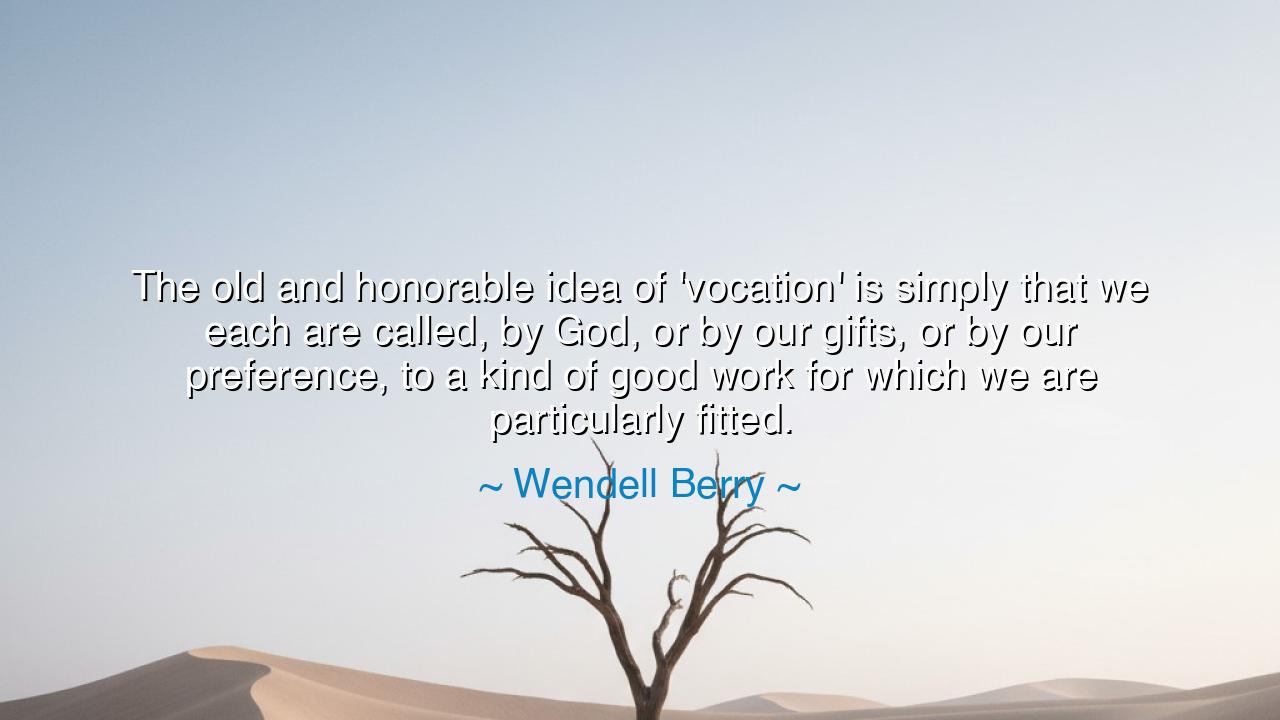
The old and honorable idea of 'vocation' is simply that we each
The old and honorable idea of 'vocation' is simply that we each are called, by God, or by our gifts, or by our preference, to a kind of good work for which we are particularly fitted.






The wise sage Wendell Berry speaks of the sacred calling of labor when he declares: “The old and honorable idea of 'vocation' is simply that we each are called, by God, or by our gifts, or by our preference, to a kind of good work for which we are particularly fitted.” In these words, he reminds us of an ancient truth: that work is not merely a means to survive, but a path to fulfill the purpose of our lives and bring harmony to the world.
The term vocation comes from the old belief that every soul has a calling. This calling may be heard as the voice of God, guiding us through the mysteries of life, or it may arise from the unique gifts placed within us from birth. Some may hear it through their passions and preferences, the quiet desires of the heart that point toward meaningful action. Whatever its source, this call draws us toward a good work that serves not only ourselves but also the greater community.
To find one’s vocation is to discover the place where personal joy meets the needs of the world. When we answer this call, our labor is no longer a burden, but a sacred offering. This good work is not merely about skill, but about alignment—the soul fitted perfectly to its task, like a key to its lock. In such harmony, work becomes a form of worship, and the worker becomes both servant and creator.
Berry’s words reflect the wisdom of ancient traditions, where craftsmen, healers, warriors, and teachers all saw their roles as divine gifts. In those times, a vocation was not chosen lightly, for it was understood to be the very path through which one fulfilled their destiny. Modern life, with its noise and haste, often obscures this truth, reducing work to mere transaction. Yet Berry calls us to return to this noble vision, to see our labor as part of the eternal dance of creation.
Thus, let this teaching be passed to future generations: seek your vocation not in the demands of the world, but in the quiet voice within. Whether through God, your innate gifts, or the passions of your heart, discover the good work for which you are fitted. For when each person walks their true path, both the soul and the world are healed, and life itself becomes an act of sacred harmony.






TBthu bui
Wendell Berry’s perspective on vocation challenges us to think about our work as more than just a job. The idea that we are all called to a unique purpose is inspiring, but what happens when that calling isn’t immediately clear? Can a vocation evolve over time, or is it something we should recognize and pursue right away? What if we’re still searching for that work we feel ‘fitted’ for? Is it wrong to feel uncertain about our true vocation?
MD7. Nguyen Thi My Duyen
Wendell Berry’s idea of vocation being a work that we are particularly fitted for by God or our own gifts feels like an inspiring call to purpose. But what about people who feel disconnected from the work they do? Is it possible to build a sense of vocation even in jobs that don’t seem to align with one’s innate talents or calling? How can we cultivate meaning in our work if we don’t feel like we’re in our true vocation?
TNNguyen Vo Thanh Nhi
Wendell Berry’s definition of vocation as something that is uniquely suited to us—whether by divine calling, talent, or personal preference—makes a lot of sense. But I can’t help but wonder if this concept is a bit idealistic. What happens when life circumstances push people into roles that don’t align with their gifts or desires? Can someone still experience fulfillment and do good work, even if they’re not in the ‘right’ vocation?
CNCHI NGUYEN
I love Wendell Berry’s view that vocation is a calling, either from God, our talents, or our preferences. It’s comforting to think that each person has a unique purpose. But it also makes me question: what if we’re unable to identify that calling? Is it okay to not feel a sense of ‘vocation’? Can we still live fulfilling lives without knowing exactly what we’re ‘meant’ to do?
CNTran Thi Cam Nhung
Wendell Berry’s concept of vocation as a calling speaks to a deep sense of purpose. It makes me reflect on how many people find fulfillment in work that aligns with their natural talents or preferences. But is the idea of a ‘vocation’ only applicable to those who are fortunate enough to discover their calling early on? What about those who have to take jobs out of necessity or survival rather than passion? Can they still find meaning in their work?